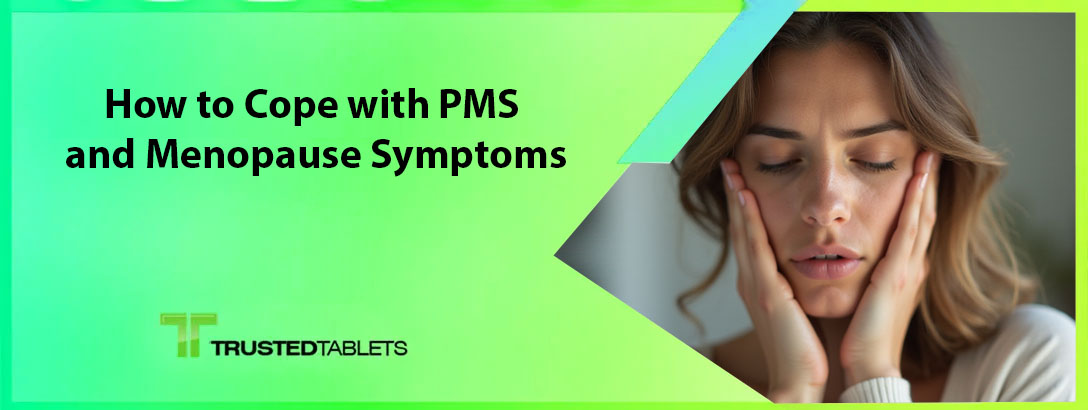Managing the complex symptoms of PMS (Premenstrual Syndrome) and menopause can be a daunting experience for many women. As we navigate through these natural life phases, it’s essential to equip ourselves with effective strategies to alleviate discomfort and enhance overall well-being. This comprehensive guide aims to provide detailed insights and practical tips to help you cope with PMS and menopause symptoms, empowering you to reclaim control over your body and mind.
Understanding PMS and Menopause
PMS encompasses a range of physical and emotional symptoms that occur before the onset of menstruation. Common symptoms include bloating, mood swings, fatigue, and breast tenderness. In contrast, menopause marks the end of a woman’s reproductive years, usually occurring between the ages of 45 and 55. This transition comes with its own set of challenges, such as hot flashes, night sweats, vaginal dryness, and mood changes. Understanding these phases is crucial for developing effective coping mechanisms.
Recognizing Symptoms
To manage PMS and menopause effectively, it’s vital to recognize the symptoms as they arise. Here are some prevalent signs:
PMS Symptoms:
- Emotional Symptoms: Irritability, anxiety, and depression.
- Physical Symptoms: Cramps, headaches, and bloating.
- Behavioral Symptoms: Changes in sleep patterns and appetite.
Menopause Symptoms:
- Hot Flashes: Sudden feelings of heat, often accompanied by sweating.
- Mood Swings: Increased irritability and emotional instability.
- Sleep Disruptions: Difficulty falling or staying asleep.
Lifestyle Modifications
Nutrition: Fuel Your Body Right
A balanced diet plays a crucial role in managing PMS and menopause symptoms. Here are some dietary tips:
- Increase Calcium and Vitamin D Intake: These nutrients are essential for bone health, especially during menopause. Consider incorporating dairy products, leafy greens, and fortified foods into your meals.
- Stay Hydrated: Drinking plenty of water helps alleviate bloating and improves overall well-being. Aim for at least 8-10 glasses of water daily.
- Limit Caffeine and Sugar: Reducing caffeine and sugar intake can help minimize mood swings and anxiety levels associated with PMS.
- Eat Regularly: Consuming smaller, more frequent meals can stabilize blood sugar levels, preventing energy crashes and irritability.
Physical Activity: Move to Improve
Regular physical activity is instrumental in managing PMS and menopause symptoms:
- Aerobic Exercise: Engaging in aerobic exercises like walking, swimming, or cycling can significantly reduce stress, anxiety, and mood swings.
- Strength Training: Incorporating strength training exercises helps build muscle mass and improves bone density, crucial during menopause.
- Mind-Body Practices: Techniques such as yoga and tai chi not only improve flexibility but also promote relaxation and stress relief.
Stress Management Techniques
Managing stress effectively can alleviate many PMS and menopause symptoms. Here are some strategies to consider:
Mindfulness and Meditation
Practicing mindfulness and meditation can significantly enhance emotional well-being. Spend a few minutes each day focusing on your breath and allowing your thoughts to settle. Apps and online resources can guide you through meditation practices.
Cognitive Behavioral Therapy (CBT)
CBT is a therapeutic approach that helps individuals identify and change negative thought patterns. It can be particularly beneficial for managing anxiety and depression related to PMS and menopause.
Connect with Support Groups
Sharing experiences with others who are going through similar challenges can provide comfort and understanding. Consider joining a local support group or an online community focused on women’s health.
Natural Remedies and Supplements
Many women find relief from PMS and menopause symptoms through natural remedies and supplements. Here are a few options to explore:
Herbal Supplements
- Chaste Tree (Vitex): Known to alleviate PMS symptoms, chaste tree may help balance hormonal fluctuations.
- Black Cohosh: Often used to reduce hot flashes and night sweats during menopause.
Essential Oils
Aromatherapy using essential oils like lavender, peppermint, and clary sage can provide relief from stress and anxiety. Consider using a diffuser or adding a few drops to your bath.
Omega-3 Fatty Acids
Incorporating omega-3 fatty acids, found in fish and flaxseed, can help reduce inflammation and improve mood.
Medical Interventions
In some cases, medical interventions may be necessary to manage severe symptoms:
Hormone Replacement Therapy (HRT)
HRT involves taking estrogen or a combination of estrogen and progesterone to alleviate menopausal symptoms. Consult with your healthcare provider to discuss potential risks and benefits.
Antidepressants
Selective serotonin reuptake inhibitors (SSRIs) can be prescribed to manage mood swings and anxiety associated with PMS and menopause.
Maintaining a Positive Outlook
Coping with PMS and menopause can be challenging, but maintaining a positive mindset is essential. Surround yourself with supportive friends and family, and remember that you’re not alone in this journey. Engage in activities that bring you joy, whether it’s pursuing a hobby, spending time in nature, or volunteering.
Conclusion
Navigating the symptoms of PMS and menopause requires a multifaceted approach that encompasses lifestyle modifications, stress management techniques, natural remedies, and, if necessary, medical interventions. By understanding your body and implementing effective coping strategies, you can reclaim control over your health and well-being during these natural life transitions.


